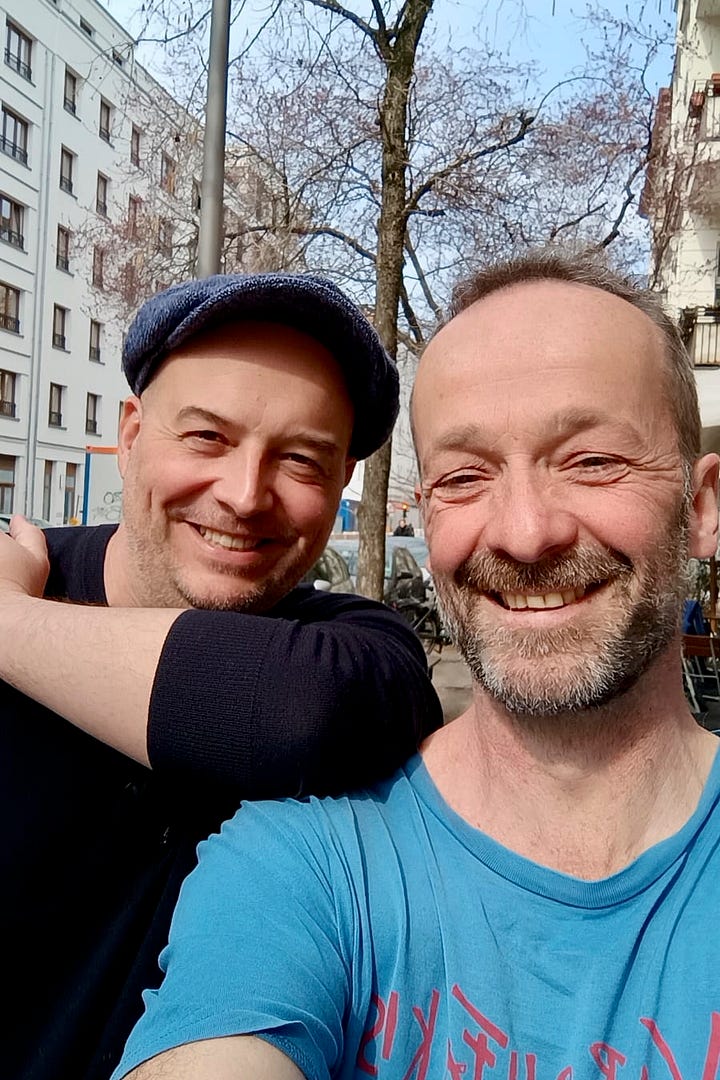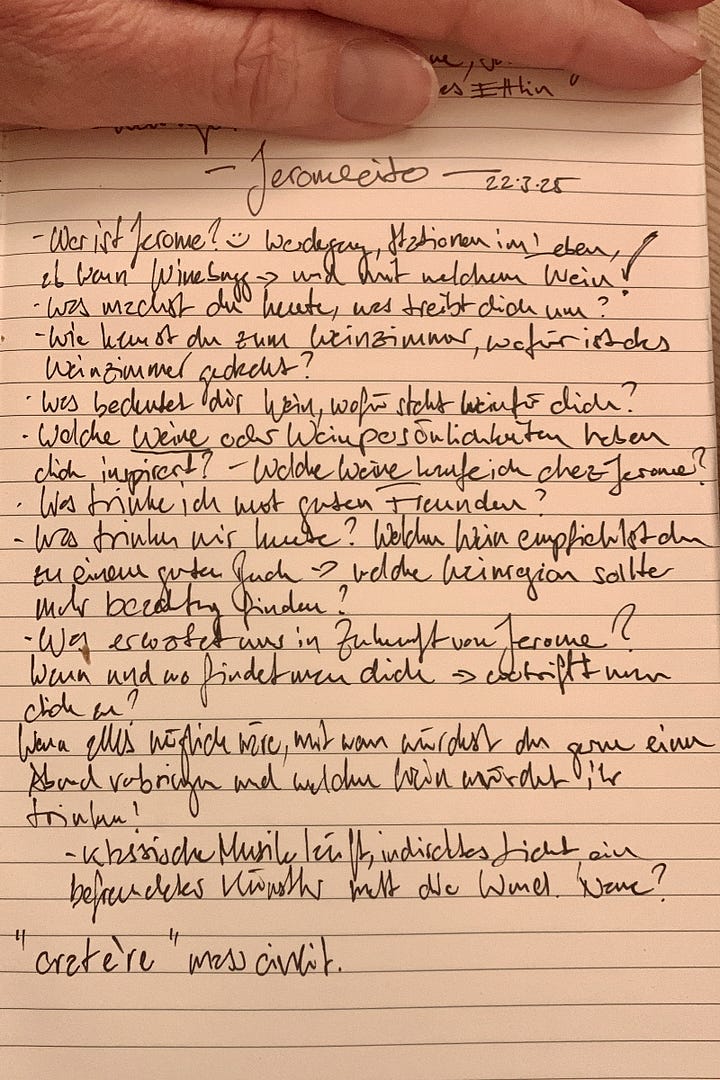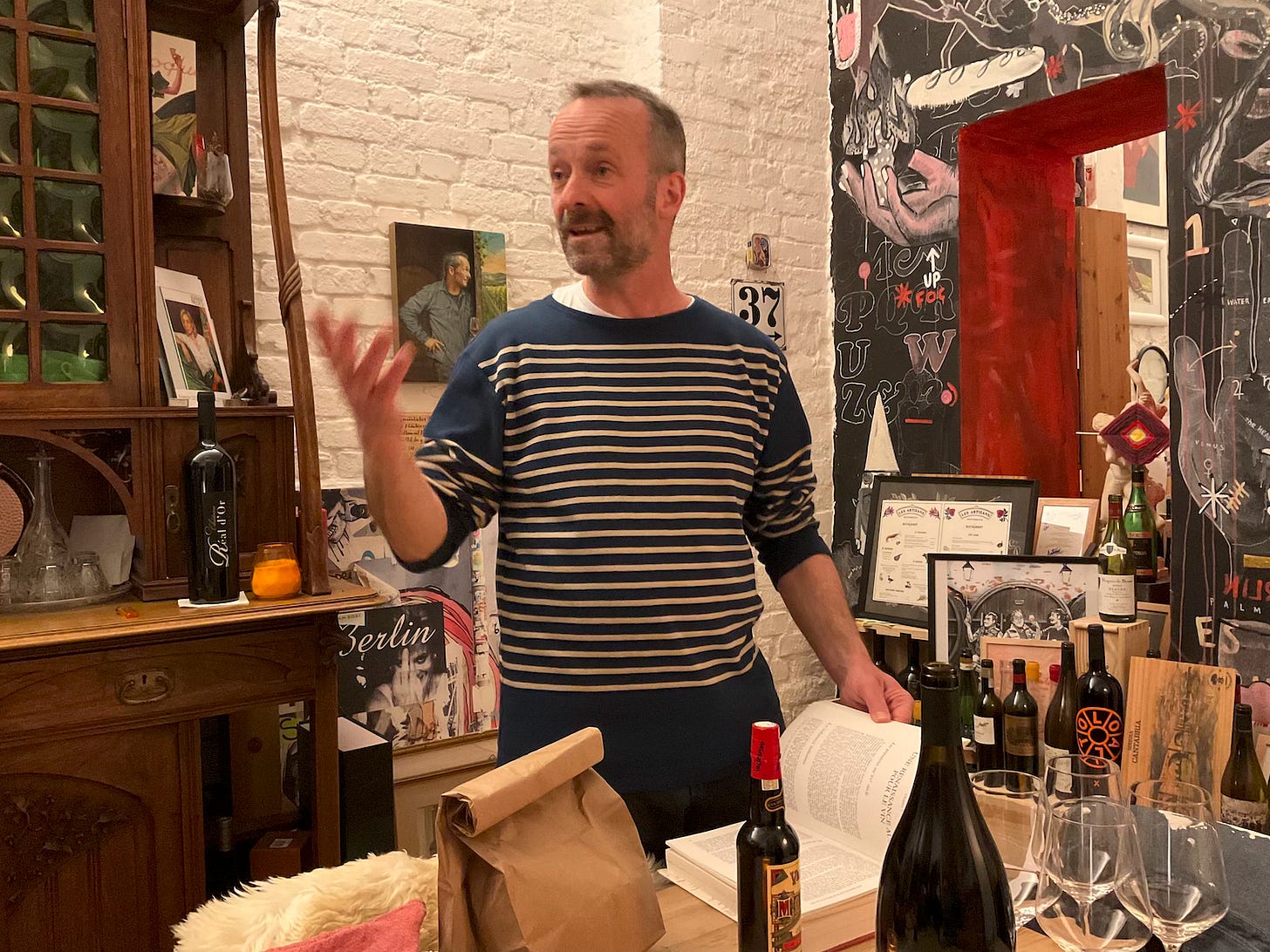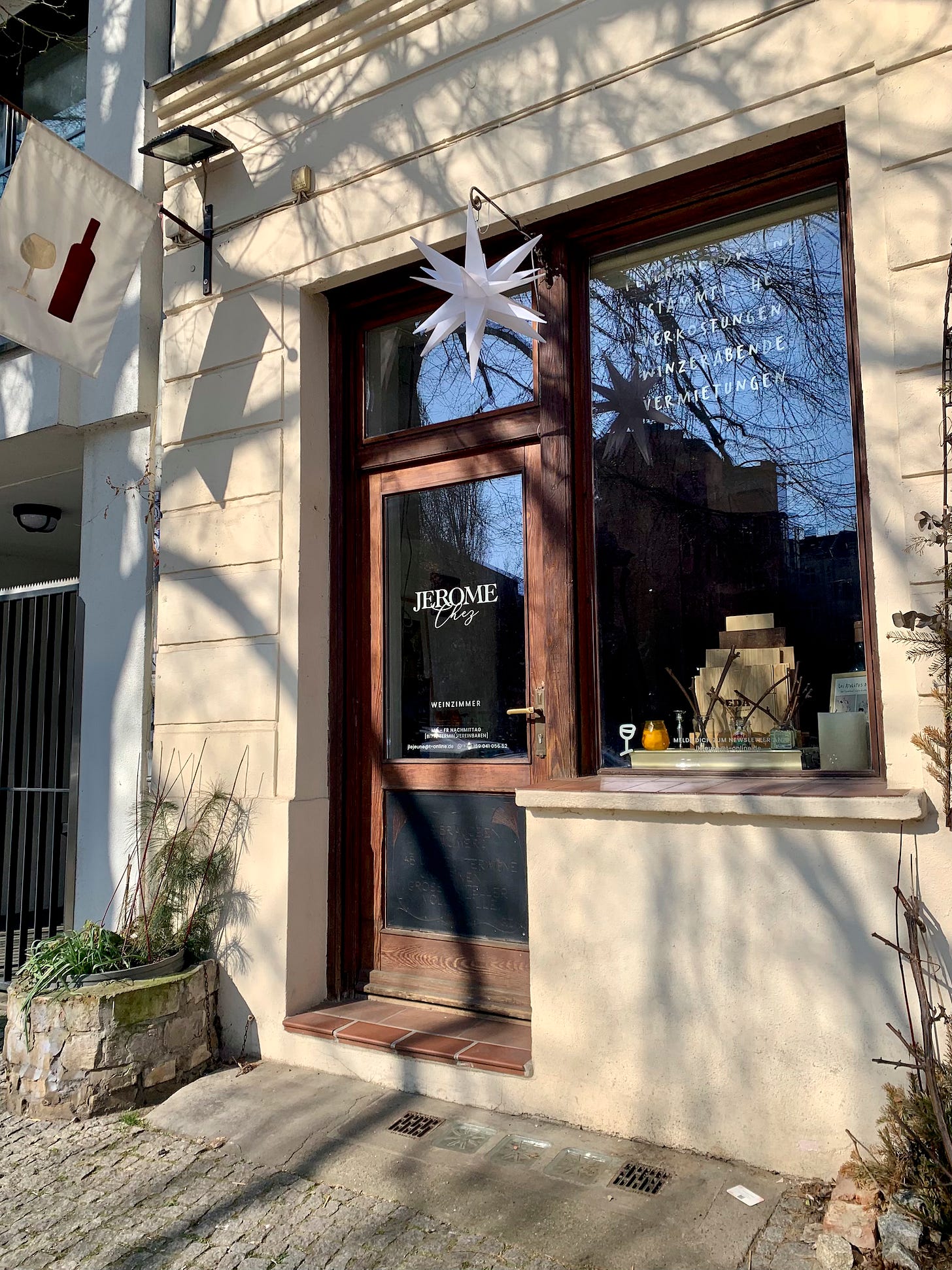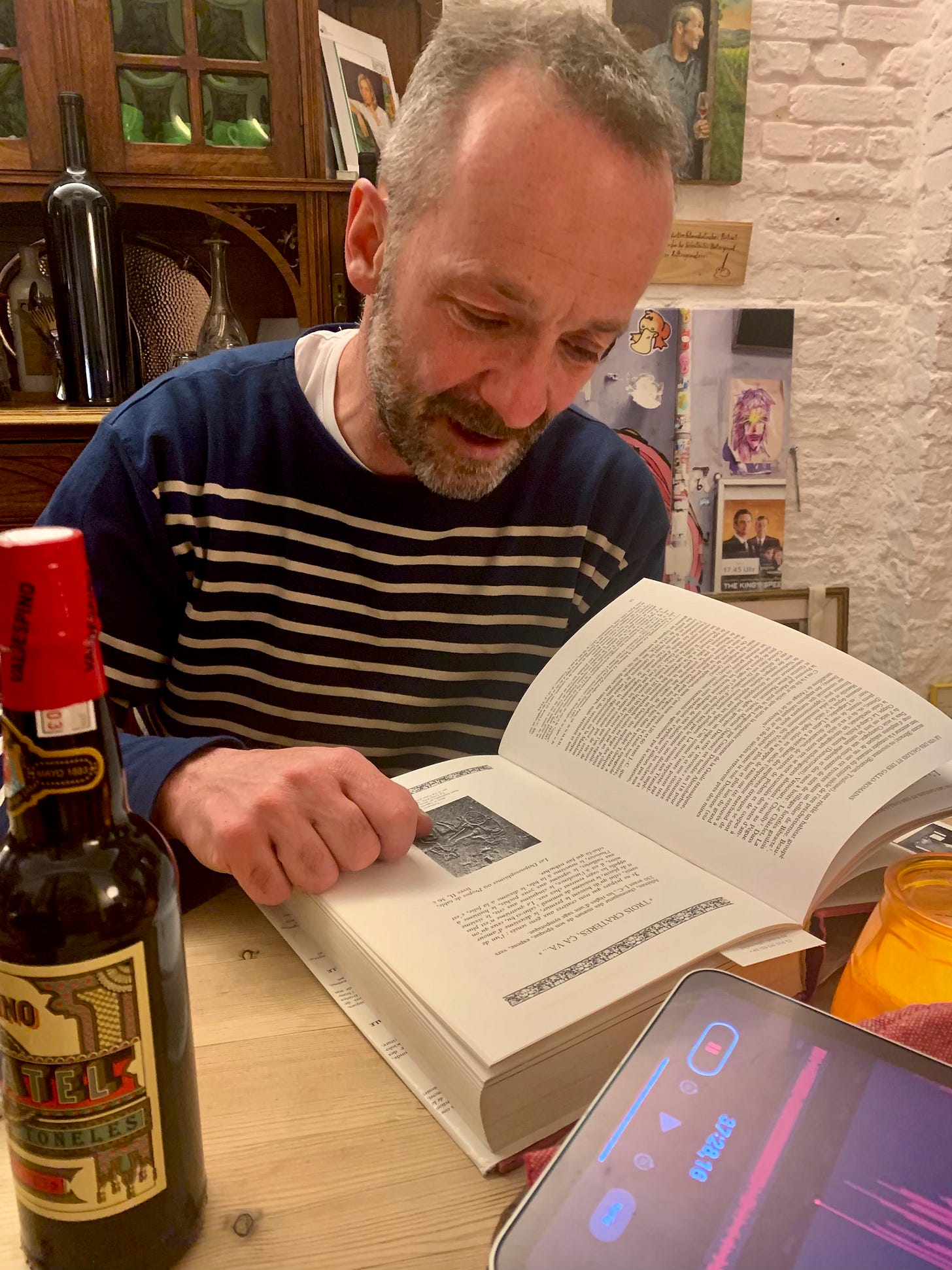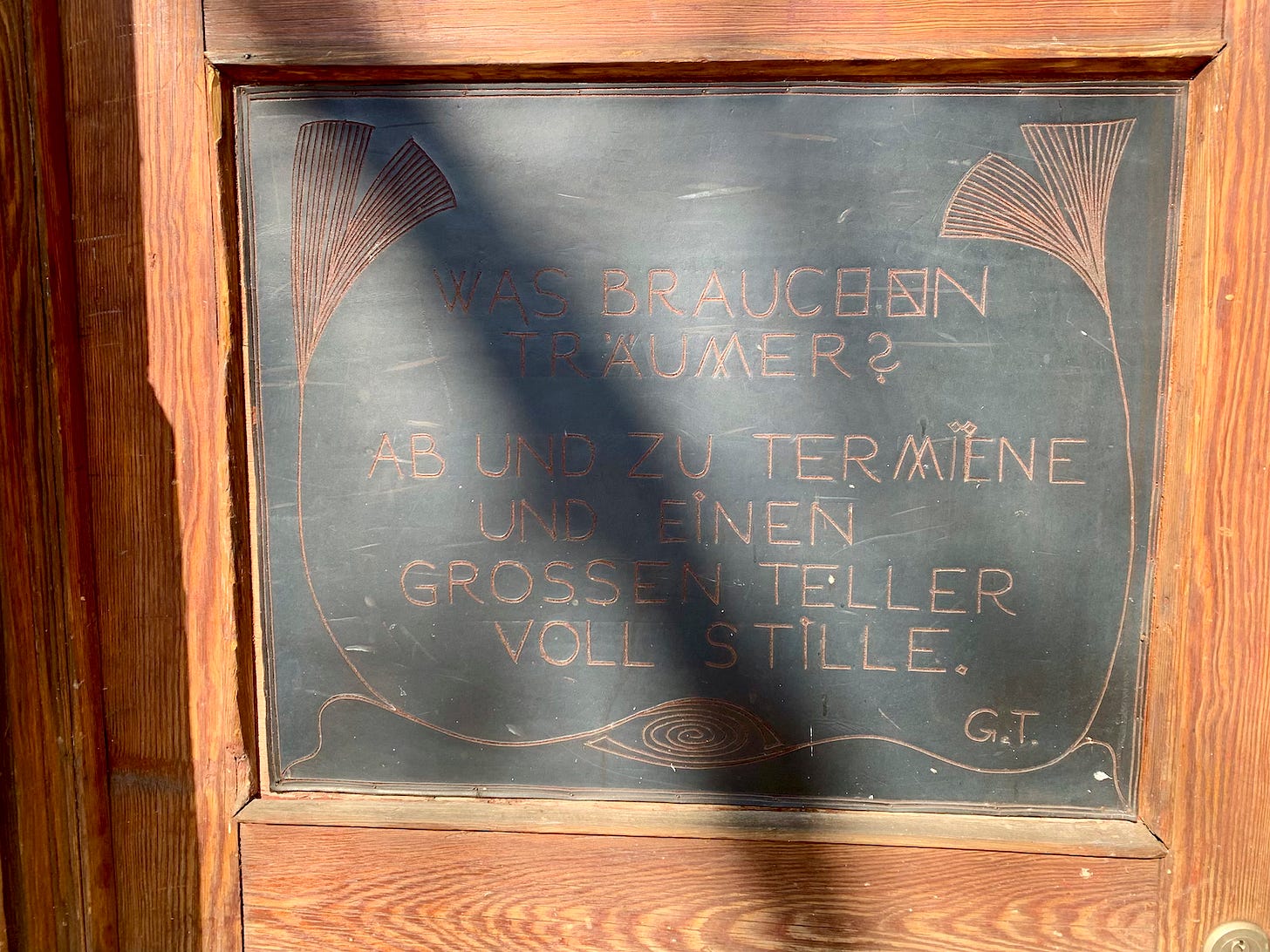Jérôme’s Table
Ten Kraters Deep – A Portrait of “Chez Jérôme”
Who is Jérôme?
The question is a complex one. I want to start at the beginning, though I might jump ahead, circle back, and start over again – because Jérôme is anything but linear.
So, from the top: I first met Jérôme Lejeune during my time as a wine buyer at Tesdorpf. He represented several Spanish wineries we worked with, and I’d run into him here and there – at tastings in different cities, at trade fairs, or in those anonymous hotel lobbies where wine people gather to talk business, laugh a little, drink a glass, and share stories.
I like Jérôme. He’s one of the warmest, kindest people I’ve met in this industry – and at the same time, one of the most restless and spontaneous. No matter when, Jérôme always replies. From a sleepy airport somewhere in southern France, or the rugged hills of the Sierra Cantabria.
He’s a whirlwind. Hard to pin down, many-sided, always all in. And he brings a deeply philosophical attitude to wine – its cultural roots, its history, its meaning.
He has a voice. And something to say.
But as I said: let me start again.
I meet Jérôme in Berlin's Prenzlauer Berg, right in the heart of trendy Kollwitzkiez, where a year ago he opened his wine room, "Chez Jérôme." A long-held dream that, as he puts it, destiny pretty much dropped at his feet.
After more than twelve years as brand ambassador for Miguel Torres, and later for the Berlin-based wine importer Solovino, Jérôme was constantly on the move: from A to B, from fair to fair. But wine connects, and the desire for something steady – a place where people could come together – kept growing stronger.
I’d always enjoyed our meetings and shared trips, and I wanted to learn more about the idea behind his wine room. So I wrote down a few questions and set out to do a little interview. But, as so often with Jérôme, things didn’t go as planned.
On Rykestrasse 37, tucked between two yoga studios, sits Jérôme’s wine room. Barely noticeable from the outside, almost too small to be real – yet filled with atmosphere. One room, one table, one soul. Soft, indirect light. Classical music hums from an old tube radio – no Spotify playlist, no Bluetooth fuss.
The furniture: antique, gifted, found in the neighborhood. On the wall, a huge painting by a friend, still evolving. In the back: a tiny, charming kitchen. And beneath a heavy trapdoor in the floor: Jérôme’s private sanctuary – his wine cellar.
Scattered everywhere: curiosities, photos, books, wine labels. And in between, always bottles. Wine. Life. Memory.
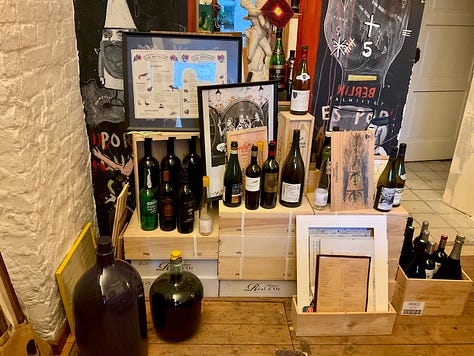
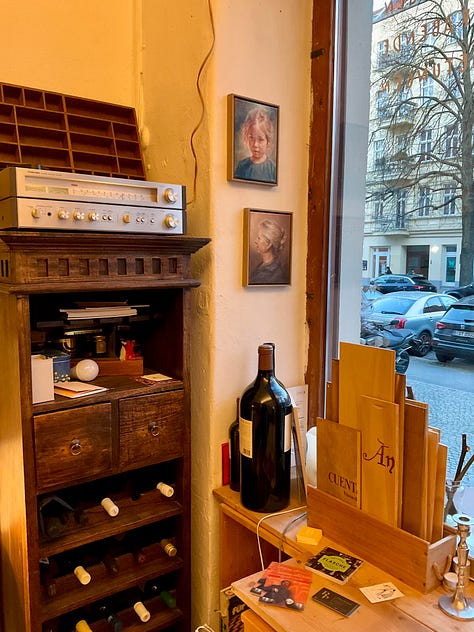
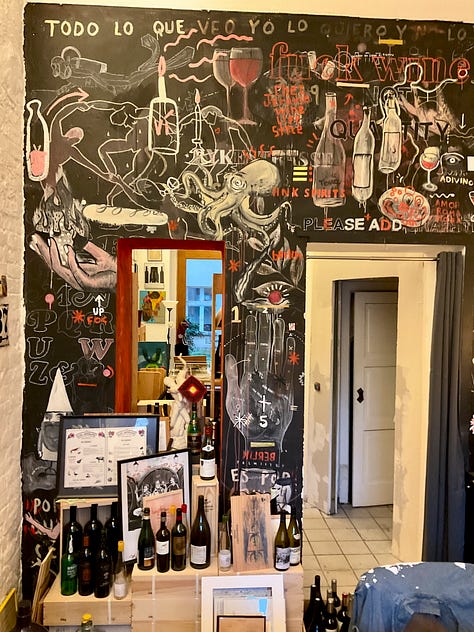
The concept behind Chez Jérôme is deliberately fluid – and that’s exactly its strength. Through his years as a brand ambassador, Jérôme met countless people with impressively rigid concepts for their wine bars and shops. "But the more tightly they clung to their concept, the faster they disappeared – zack, c’est fini, gone," he says with a shrug.
His own approach is more open, more intuitive – and maybe that’s what gives it staying power.
Chez Jérôme is more than a place. It’s fluid. Alive. A place to come together – a social thread. It unfolds every night, again and again.
And as our evening begins, it’s clear: this won’t be the tidy interview I had prepared. Quite the opposite. Over the course of the night, Jérôme will not give a single straight answer. And that, I realize, is the essence – of his concept, his nature: constant motion, creativity, adaptability – always driven by heart.
What he truly enjoys is when the guests create the evening themselves. They become the concept. Just like tonight.
We are eight around the table by now, as two of Raquel’s close friends (Jérôme’s partner) have joined us mid-conversation. And I start to get a clearer picture of what Chez Jérôme is about.
Every Friday, there’s a local Stammtisch. Neighbors drop in, pay for their wine, join the table – and talk. About the wine, the glasses, the music, the light. About life.
That’s Chez Jérôme: it thrives on encounter, grows through exchange, and evolves with each evening.
Thanks to Jérôme’s far-reaching connections, remarkable items keep finding their way into the space. Like an Art Nouveau display cabinet from a once-famous Berlin furniture house. Or a heavy ashtray – a relic of the city's slightly dodgy 20th-century past. Every piece has a story. And Jérôme knows them all.
"Wait, I want to find a text we can read together," he says, flipping through a worn-out book – an original edition, he insists. Then he stops. "Here, you can read this one, Olivercito."
He shows me a passage from Gilbert Garrier's Histoire sociale et culturelle du vin. The chapter is titled: "Propos de Table – The Rules of Regulated Drinking" – originally by Eubulos, an Attic poet from the 4th century BCE:
The first krater is for health.
The second, for love and joy.
The third brings sleep – and the wise go home after that.
The fourth no longer belongs to us. It is the cup of provocation, for fools.
The fifth leads to shouting, the sixth to ridicule.
The seventh to brawling.
The eighth brings in the lawyer, the ninth the police.
And the tenth – that one is for madness.
Jérôme grins. "And no, I won’t ask you which krater we’re on."
What sounds like a playful drinking poem is, in truth, a miniature philosophy of life. The Greeks called it sōphrosynē – moderation, self-control. Virtue wasn’t about not drinking. It was about knowing when to stop. Wine became a measure: those who respected the limit kept their dignity. Those who didn’t found themselves in the tenth krater – the one of madness.
And maybe that’s what makes this text feel so modern. In a time where everything is available, scalable, constantly "more," the idea of enough feels almost radical. The question of "how much is enough" doesn’t stop at the glass.
Maybe this wasn’t random reading after all. Maybe Jérôme’s wine room is just that kind of place: where a little wisdom is served alongside the wine – by the glass.
So what does wine mean to Jérôme?
"Connection," he says. "A social thread. A pleasure."
Then he drifts off, thumbing through another book. "Drunk! has a great bit on that. Or The French Paradox? Back then, people drank a lot more. It’s all about the dose."
Wine, for him, isn’t theatre. It’s not about etiquette or performance. He wants to democratize wine. "You don’t have to be afraid of it. Here in the wine room, people should feel free. Drink what they want. Nothing forced, everything possible."
His relationship with wine is practical, but never cold. "I come from a family of pastry chefs. My father, my grandfather, my great-grandfather – all of them in the bakery. Except me. I’m useless. Truly." He laughs. "But now my son is getting into cooking – so who knows. Maybe the Lejeune line lives on."
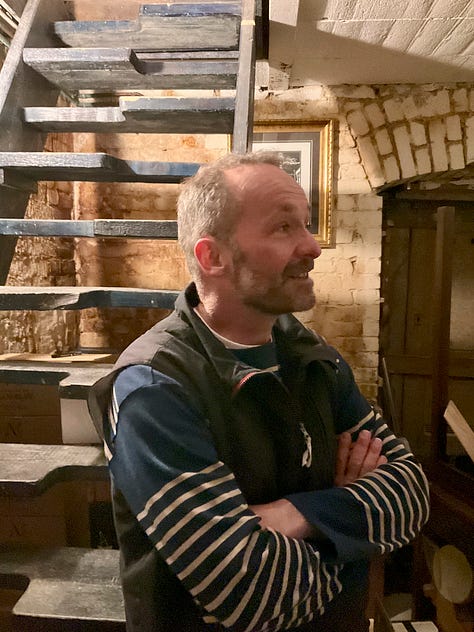
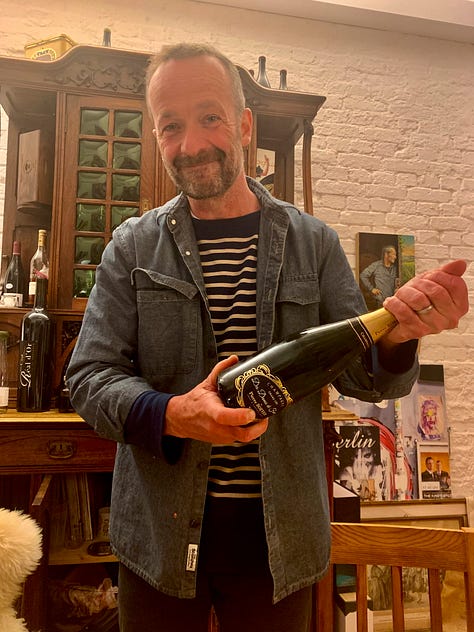
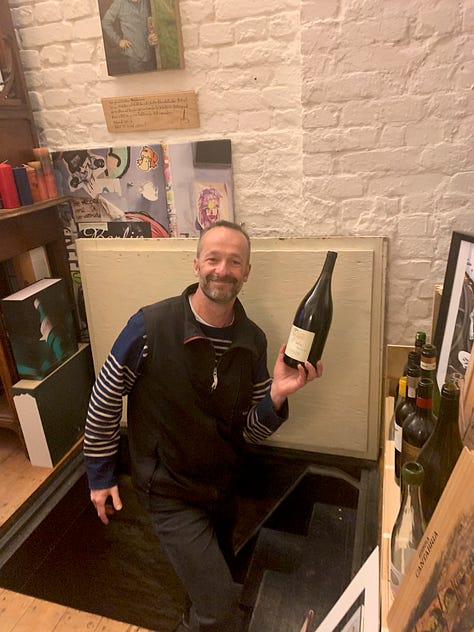
When I ask who he’d most like to share a bottle with, the answer is immediate: Telmo Rodríguez. Jérôme worked with his wines from Remelluri and Bodegas Lanzaga back in his days at Véritable, and Telmo stayed with him as a figure of conviction.
"He stands for preserving the cultural heritage of wine. Someone who doesn’t just play the game, but questions it. He knows the laws, the market limits – and still shows backbone."
And what would they drink? "Something unexpected. Not a trophy bottle. Maybe something from the southern Burgundy – Guillot-Broux. Or from Roussillon. Domaine des Soulanes, the white. Slightly chilled. Then we talk."
And then Jérôme says something that lingers:
"The best wine tastes good even alone – if someone asks how you are. Why you’re sitting there. That’s wine."
He says it without any drama, just quietly – eyes on his glass, as if the answer was right there.
I nod. Say nothing. The evening is already in full flow. Laughter bubbles up around us, someone refills a glass, another nearly tips over. The conversation drifts into new directions, the way it always seems to at Jérôme’s table.
And that’s what this place is. No agenda. No script. Just wine, connection – and space for whatever wants to happen.
Chez Jérôme WeinZimmer
Rykestrasse 37
10405 Berlin
Mo.-Fr. 5 - 7 p.m.
Authors note:
I’ve met countless people through wine – but few like Jérôme. He’s not a brand, he’s not a trend, and he doesn’t care about polish. What he does care about is connection, culture, and the right kind of chaos. Writing this wasn’t planned. It just happened – like most good evenings at his table. Maybe that’s exactly the point.
